Mega donors fuel over $40 million in donations for record-shattering 2023 Wisconsin Supreme Court race
A few ultra-wealthy donors play an outsize role as liberal Janet Protasiewicz competes against conservative Daniel Kelly in the 2023 spring election for an open seat on the Wisconsin Supreme Court.
Wisconsin Watch
April 3, 2023
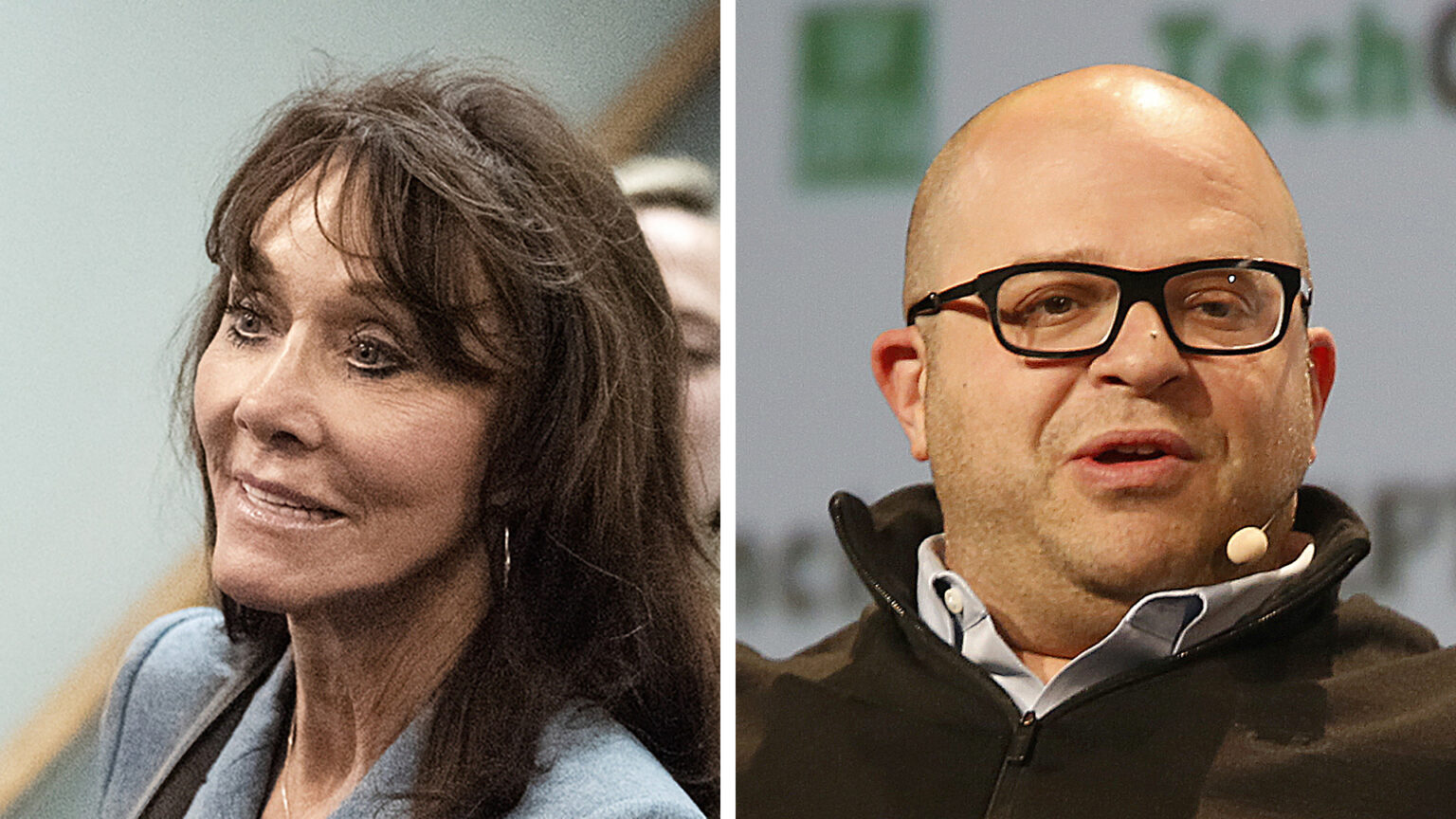
Diane Hendricks and Jeff Lawson have each made major donations to the campaigns of Wisconsin Supreme Court candidates Daniel Kelly and Janet Protasiewicz, respectively. (Credit: Angela Major / The Janesville Gazette via AP and Liz Hafalia / San Francisco Chronicle via AP)

Days before the Wisconsin Supreme Court election a major union representing transit workers wrote an $18,000 check to Milwaukee County Circuit Judge Janet Protasiewicz’s campaign.
For the Amalgamated Transit Union, which represents bus drivers and mechanics, it was a huge donation compared with their previous donation to a Wisconsin Supreme Court candidate in 2018 for just $250.
“There’s a lot on the line with the Supreme Court race here,” said Donnell Shorter, head of the ATU Local 998 in Milwaukee.
But that $18,000 is a drop in the bucket compared with the contributions of a few dozen ultra-wealthy donors.
Recent filings show a total of 41 individual donors wrote Protasiewicz’s campaign checks for the statutory maximum of $20,000. Former Justice Daniel Kelly’s campaign received at least 21 such donations over the same period.
The disparity between wealthy donors and contributions raised by working Wisconsinites doesn’t sit right with Shorter.
“I represent basically 1,600 people,” Shorter said. “Their voices won’t be heard as loudly as that one billionaire, that one celebrity.”
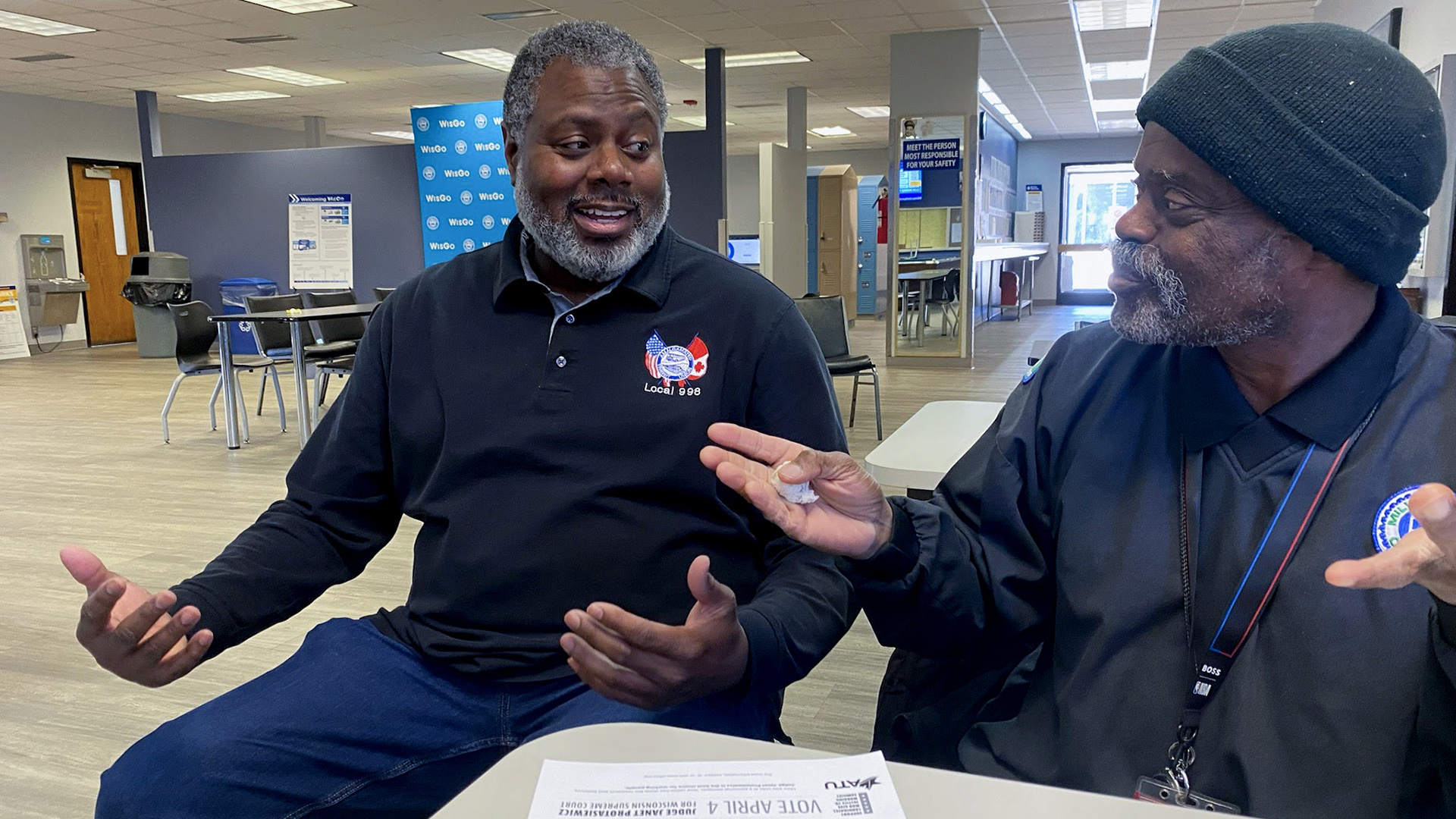
Amalgamated Transit Union Local 998 president Donnell Shorter, left, speaks with a union Milwaukee bus driver. ATU, which represents 200,000 transit workers across North America, has contributed the maximum $18,000 allowed to Janet Protasiewicz’s Wisconsin Supreme Court campaign. In past years it would contribute just a few hundred dollars. (Credit: Courtesy of ATU)
Both campaigns have boasted record-shattering fundraising from their political allies, but a Wisconsin Watch analysis shows the lion’s share of campaign cash is coming from special interest groups and a relatively small number of deep-pocket donors across the political spectrum.
Records show Protasiewicz received nearly 25,000 individual donations for $50 or less, totaling $568,549. That’s still less than the $820,000 donated by the top 41 donors to her campaign including $20,000 checks from Hollywood director Steven Spielberg and his wife, actress Kate Capshaw.
Kelly’s campaign has consistently trailed in individual donations large and small. His campaign received 3,803 individual donations of $50 or less totaling $139,620. That’s only a third of the amount from his top 21 donors who wrote $20,000 checks.
And those are just donations directly to the candidate campaign funds. Some of the maximum campaign donors have also given $1 million or more to political action committees or political parties to flood the internet and airwaves with campaign ads. And more money has flowed into the campaign via so-called “issue advocacy” groups that aren’t required to disclose their donors, often referred to as “dark money.””
Kelly leads in support when all spending is counted.
WisPolitics.com estimates the Wisconsin Supreme Court spending is on pace to break $45 million, demolishing the previous record $10 million spent in the 2020 high court contest. The previous national record was $15 million in the 2004 Illinois Supreme Court election.
The infusion of supersized checks from both philanthropists and industrialists has good governance groups aghast.
“There’s just an obscene amount of money on both sides of this thing, which raises some serious questions for our democracy,” said Matt Rothschild, executive director of the Wisconsin Democracy Campaign. “The voices of average Wisconsinites are being drowned out, so we don’t have an equal say as to who’s having influence over our elections.”
Out-of-state donors dig deep for liberal cause
Protasiewicz’s campaign has benefited from donors such as Oklahoma energy heirs Lynn Schusterman and Stacy Schusterman, who each donated $20,000 and also a combined $1 million to the state Democratic Party.
According to Wisconsin campaign finance records, Manhattan dance school director Hana Ginsburg Tirosh wrote a $20,000 check to Protasiewicz’s campaign. She and her Wall Street trader husband Raz Tirosh made headlines for purchasing actress Susan Saranadon’s $7.9 million Manhattan loft in 2020.
Raz Tirosh’s firm, Jane Street, was called “the top Wall Street firm no one’s heard of,” according to a 2021 Financial Times profile, having traded $17 trillion in assets in 2020 alone.
At least three of his colleagues at Jane Street — Sandor Lehoczky, Ron Minsky and James McClave, and their partners — also gave max campaign contributions, increasing the cash haul from households tied to the firm to $120,000.
That same day, just five days before the February primary, a pair of $20,000 donations also arrived from San Francisco courtesy of Twilio CEO Jeff Lawson and his physician wife Erica.
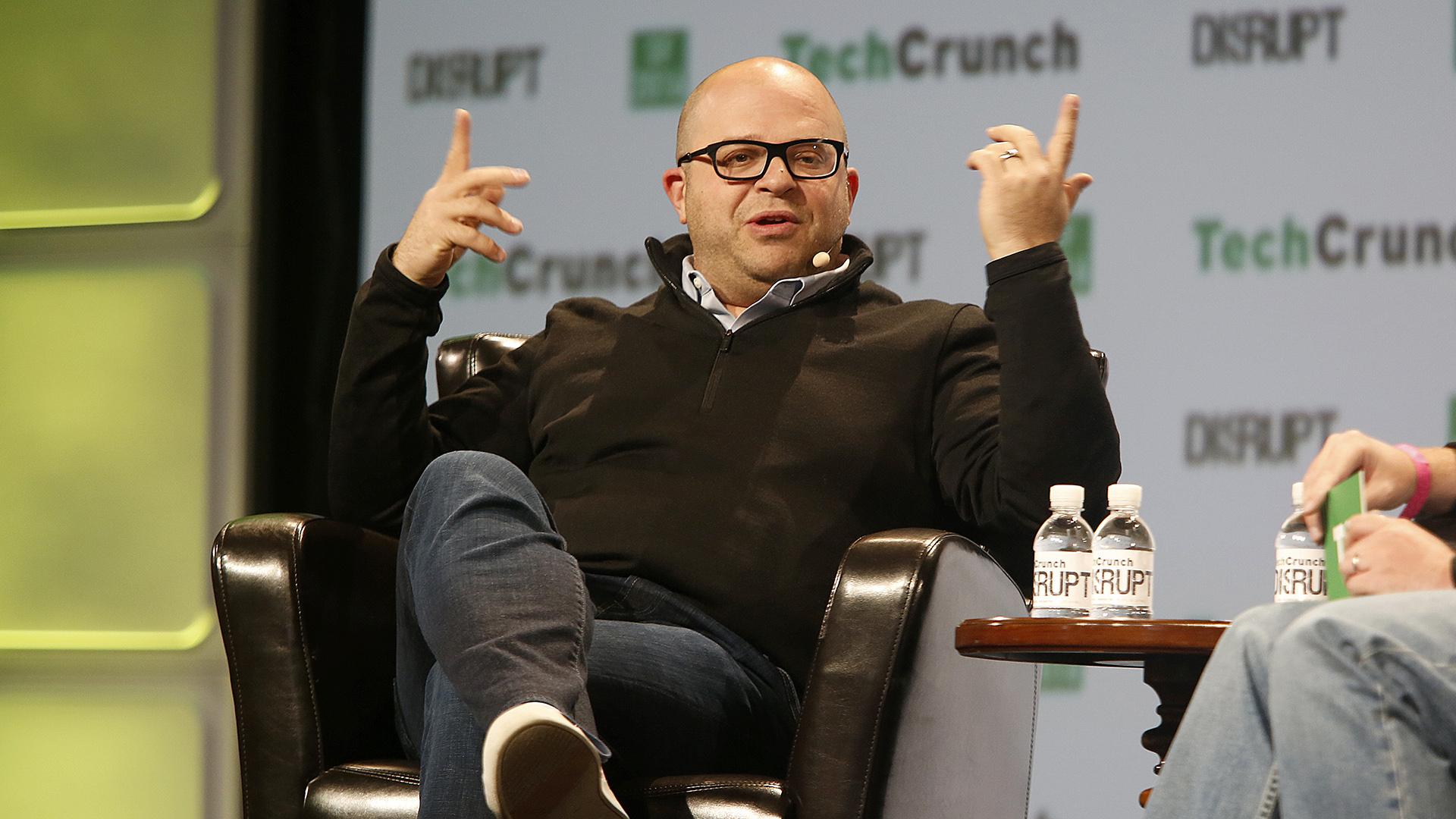
Twilio CEO Jeff Lawson speaks at TechCrunch Disrupt in 2016 in his hometown San Francisco. He and his wife each contributed the maximum $20,000 to liberal Wisconsin Supreme Court candidate Janet Protasiewicz’s campaign a week before the February primary. (Credit: Liz Hafalia / San Francisco Chronicle via AP)
The Protasiewicz campaign didn’t directly address whether the combined $200,000 in maximum donations were somehow coordinated in a 24-hour span in mid-February.
Campaign spokesperson Sam Roecker said Protasiewicz did not travel out-of-state to solicit the funds. He said it’s no surprise the race is receiving national attention. As of the March 27 pre-election filing deadline, her campaign has raised more than $15 million.
“It’s widely known that Wisconsin’s Supreme Court came one vote short of overturning the 2020 election,” Roecker wrote in a statement. “So there is interest across the country in making sure Judge Janet Protasiewicz, the pro-democracy and pro-rule-of-law candidate, is elected over an extreme right-wing activist like Dan Kelly.”
Committees do heavy lifting for Kelly camp
Before the primary, Kelly’s campaign reported a pair of $20,000 donations — from Leonard Leo, co-chair of the conservative Federalist Society and Beloit industrialist Diane Hendricks, a top-tier Republican Party patron, who recently gave $200,000 to the Wisconsin GOP. But subsequent campaign records show a flurry of activity with at least 21 individuals writing $20,000 checks to the campaign.
They include Michael White, chair and owner of major Milwaukee industrial manufacturer Rite-Hite, who penned an infamous email warning his 1,400 employees of “personal consequences” if President Barack Obama was re-elected in 2012.
Northwestern Mutual chair and CEO John Schlifske and his wife Kim also contributed a combined $40,000.
The family owners of Sargento Foods, the Plymouth-based cheese giant, also gave generously to the Kelly campaign, with retired executive Louis Gentine and his wife Michelle shelling out $20,000 each in addition to the $100,000 he gave to the Wisconsin GOP. His son, Sargento CEO Louie Gentine, followed suit three days later with a maximum donation of his own.
For Kelly, other in-state interests include Wisconsin Manufacturers & Commerce, the state’s largest business lobby. Real estate interests have also contributed about $37,000 from their membership and a Realtors’ PAC.
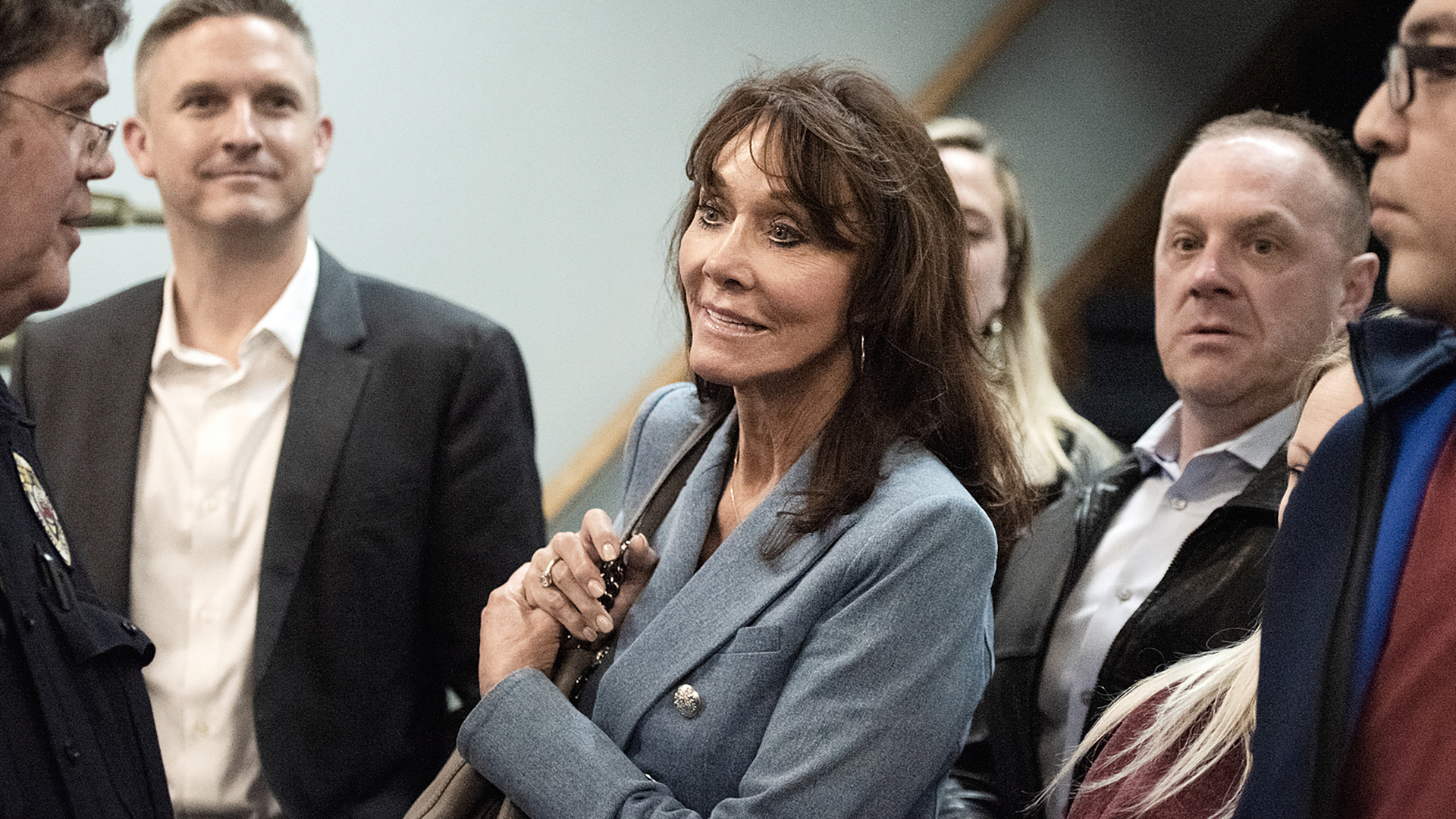
Wisconsin billionaire Diane Hendricks attends a forum at Beloit College on March 27, 2019. The Beloit industrialist wrote a check to the Daniel Kelly campaign for $20,000 and made a $200,000 contribution to the Wisconsin Republican Party, which is supporting Kelly in the race for Wisconsin Supreme Court. (Credit: Angela Major / The Janesville Gazette via AP)
Protasiewicz appears to hold a lopsided advantage in direct donations. But that’s not the whole story, cautioned Douglas Keith of the Brennan Center for Justice, which tracks money in politics.
That’s because Kelly’s core mega donors have funneled millions into committees running attack ads against his opponent. Wisconsin Democracy Campaign estimates $13.7 million has been spent supporting Kelly or attacking his opponents. Protasiewicz’s allies have spent nearly $11.2 million on her behalf.
“Dan Kelly is raising significantly less money than Janet Protasiewicz,” Keith said. “But Dan Kelly also has gotten substantially more outside money support.”
Illinois billionaire Richard “Dick” Uihlein has funneled at least $4 million into the Fair Courts America PAC that he controls.
The PAC spent at least $5.4 million on advertising attacking Kelly’s opponents including during the primary. And it’s only one of several committees that has spent millions in advocacy and attack advertising in the Wisconsin race. His wife, Elizabeth Uihlein, gave $500,000 to the Wisconsin Republican Party during the campaign.
While donors face caps on direct donations to campaigns, PACs can receive unlimited contributions. And critics say they often blur rules designed to create a firewall between a candidate’s campaign and committees raising unlimited cash.
“They can do whatever they want,” Keith said. “But the limit on them is that they can’t coordinate with the candidates, because then it becomes not independent spending, it becomes a contribution to the candidate.”
In practice that’s often a wink-and-a-nod arrangement between a candidate and wealthy backers, Keith said.
“I see candidates not raising the amount of money you would expect them to raise,” Keith said of direct donations, “which suggests to me that they have a reason to think that they don’t need to raise as much money as candidates in the past have raised.”
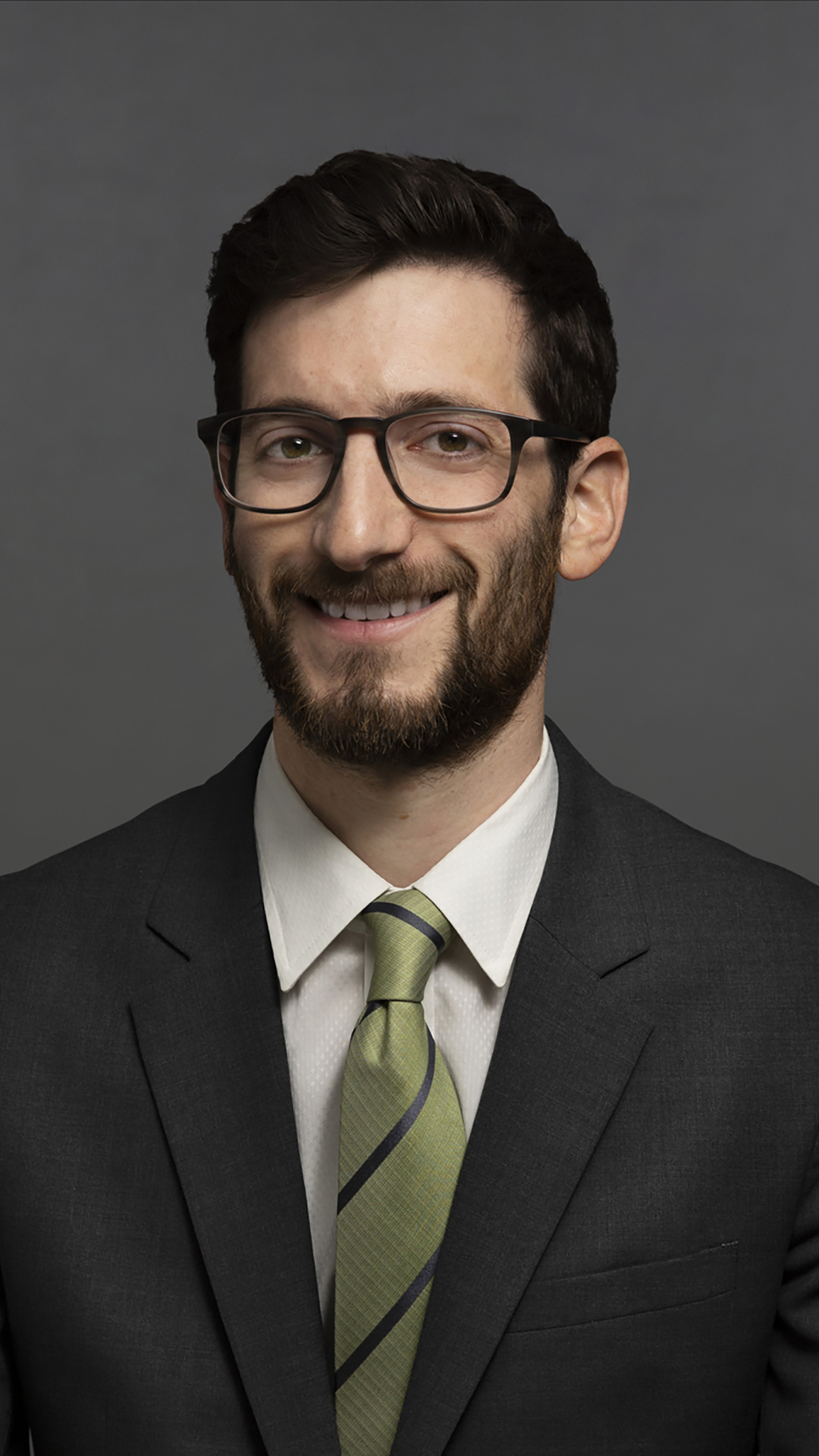
Brennan Center for Justice lawyer Douglas Keith says dark money groups – in which campaign donors are not publicly disclosed – have given conservative Daniel Kelly a slight edge in fundraising in the Wisconsin Supreme Court race. (Credit: Courtesy of Brennan Center for Justice)
Even so, Kelly’s campaign has tried to single out his opponent as beholden to outside interests.
“Janet Protasiewicz is D.C. liberals’ flavor of the week because they know she would be the most openly partisan judicial activist Wisconsin has ever seen,” Kelly campaign spokesperson Ben Voekel wrote in a statement to Wisconsin Watch. “While (she) relies on out-of-state mega donors and state party bosses to fund her campaign, Justice Kelly is proud to have the support of grassroots activists across the state of Wisconsin.”
‘Billionaires on the left, billionaires on the right’
Observers like Rothschild lament that the race is being run on cash from a relatively small cadre of donors on each side.
“It looks like it’s boiling down to a race to see whether (state Democratic Party chair) Ben Wikler can speed dial billionaires faster than Richard Uihlein can transfer money into his misnamed Fair Courts PAC,” Rothschild said. “And that’s not how our democracy is supposed to function.”
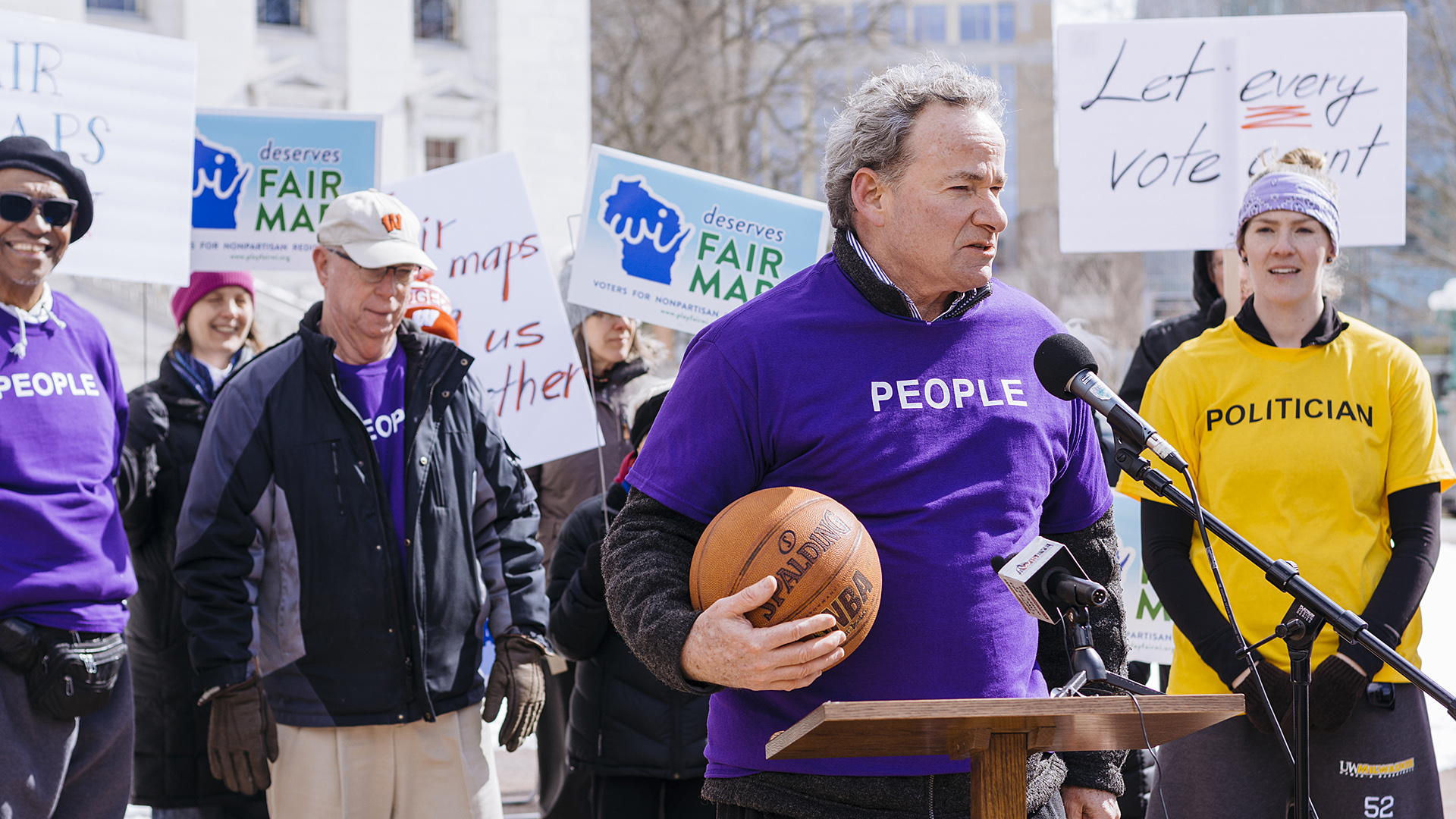
Matt Rothschild, executive director of the Wisconsin Democracy Campaign, speaks at a 2018 rally for nonpartisan redistricting. Rothschild says campaign donations from mega donors from across the political spectrum are drowning out ordinary Wisconsinites. (Credit: Cameron Smith / Wisconsin Watch)
Wisconsin Manufacturers & Commerce, a conservative pro-business group, has spent more than $5.8 million through its public advocacy arm on political ads, according to the Brennan Center’s tracking. Because it runs “issue ads” that don’t explicitly advocate for or attack a candidate, they are not required to register as a campaign group or disclose their funding.
A Better Wisconsin Together Political Fund, a coalition of labor unions and progressive social advocacy groups, has spent more than $5 million on ad buys attacking Kelly’s stance on abortion and other issues.
That’s how organized labor gets around the $18,000 spending cap on direct contributions to Supreme Court candidates. Major national unions like American Federation of Teachers have contributed $500,000, while the International Union of Operating Engineers PAC has forked over $300,000 to A Better Wisconsin Together.
The Monona-based political fund has also received at least a quarter million dollars from Lynde Uihlein, a more liberal cousin of Richard Uihlein, whose family’s wealth can be traced back to the Schlitz beer dynasty. That’s on top of the $400,000 Lynde Uihlein gave to the state Democratic Party.
Just south of the border, Illinois Gov. J.B. Pritzker — a billionaire from a prominent hotel chain dynasty — recently donated $20,000 directly to the Protasiewicz campaign and cut a $1 million check to the Wisconsin’s Democratic Party.
- Milwaukee County Circuit Court Judge Janet Protasiewicz has raised far more than opponent Daniel Kelly in individual donations, although a large share of her funding comes from a small number of ultra wealthy donors. (Credit: Coburn Dukehart / Wisconsin Watch)
- Former Supreme Court Justice Daniel Kelly has raised less money than his opponent, but outside groups have spent more on his campaign. (Credit: Coburn Dukehart / Wisconsin Watch)
The nominally nonpartisan race is flush with party cash. Filings show the state’s Democratic Party has spent more than $9.3 million to support Protasiewicz’s campaign. She pledged to recuse herself from any cases brought to the high court by Democrats. Kelly’s campaign has received more than $578,000 from the state Republican Party and various county committees.
A change of state law in 2015 removed caps on donations to parties and allowed parties to make unlimited contributions to candidates.
Wisconsin Watch reached out to more than a dozen ultra-wealthy donors who cut $20,000 checks to the Protasiewicz or Kelly campaigns.
Only a handful replied. None were willing to comment.
The nonprofit Wisconsin Watch collaborates with WPR, PBS Wisconsin, other news media and the University of Wisconsin-Madison School of Journalism and Mass Communication. All works created, published, posted or disseminated by Wisconsin Watch do not necessarily reflect the views or opinions of UW-Madison or any of its affiliates.
 Passport
Passport




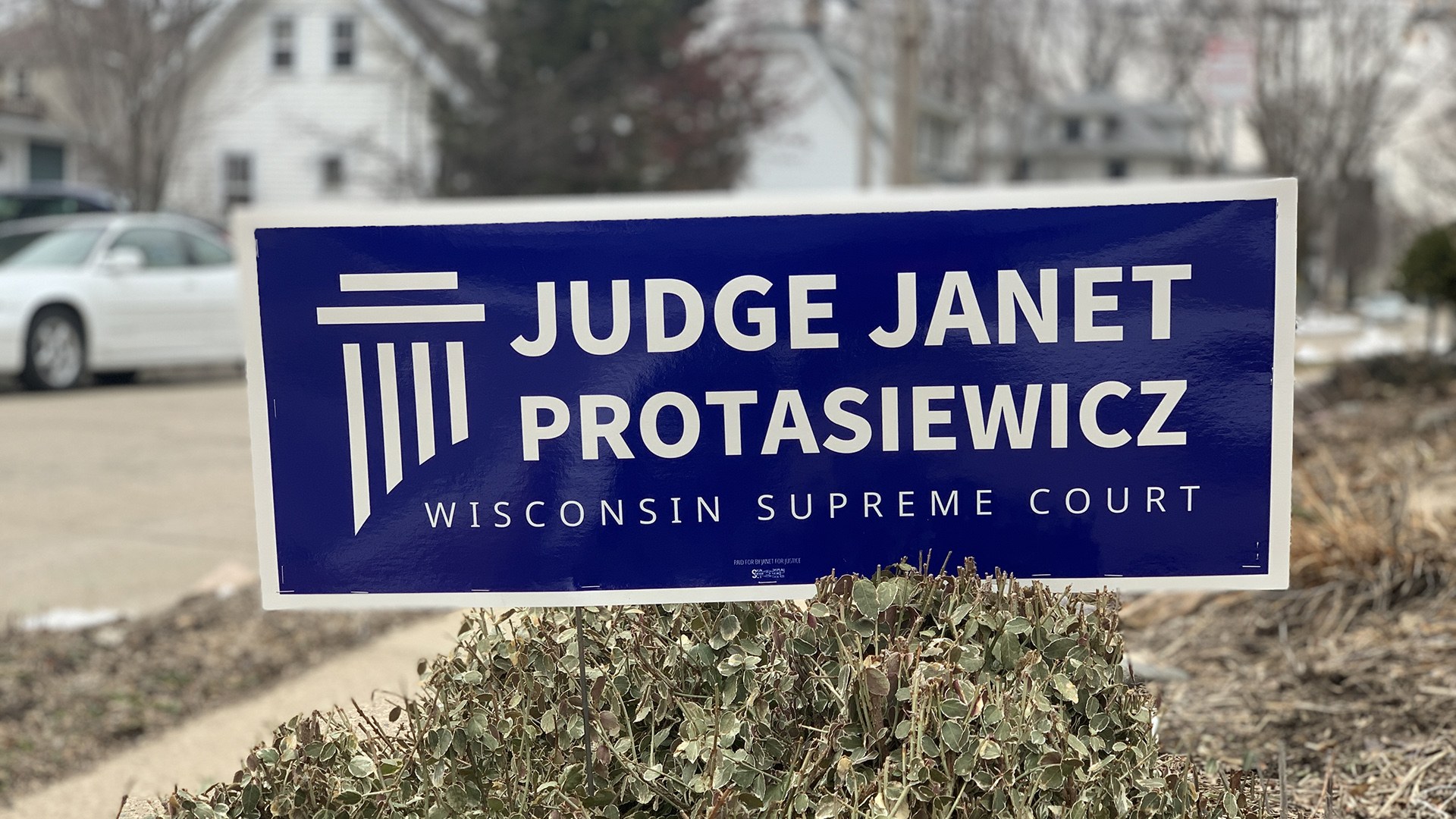
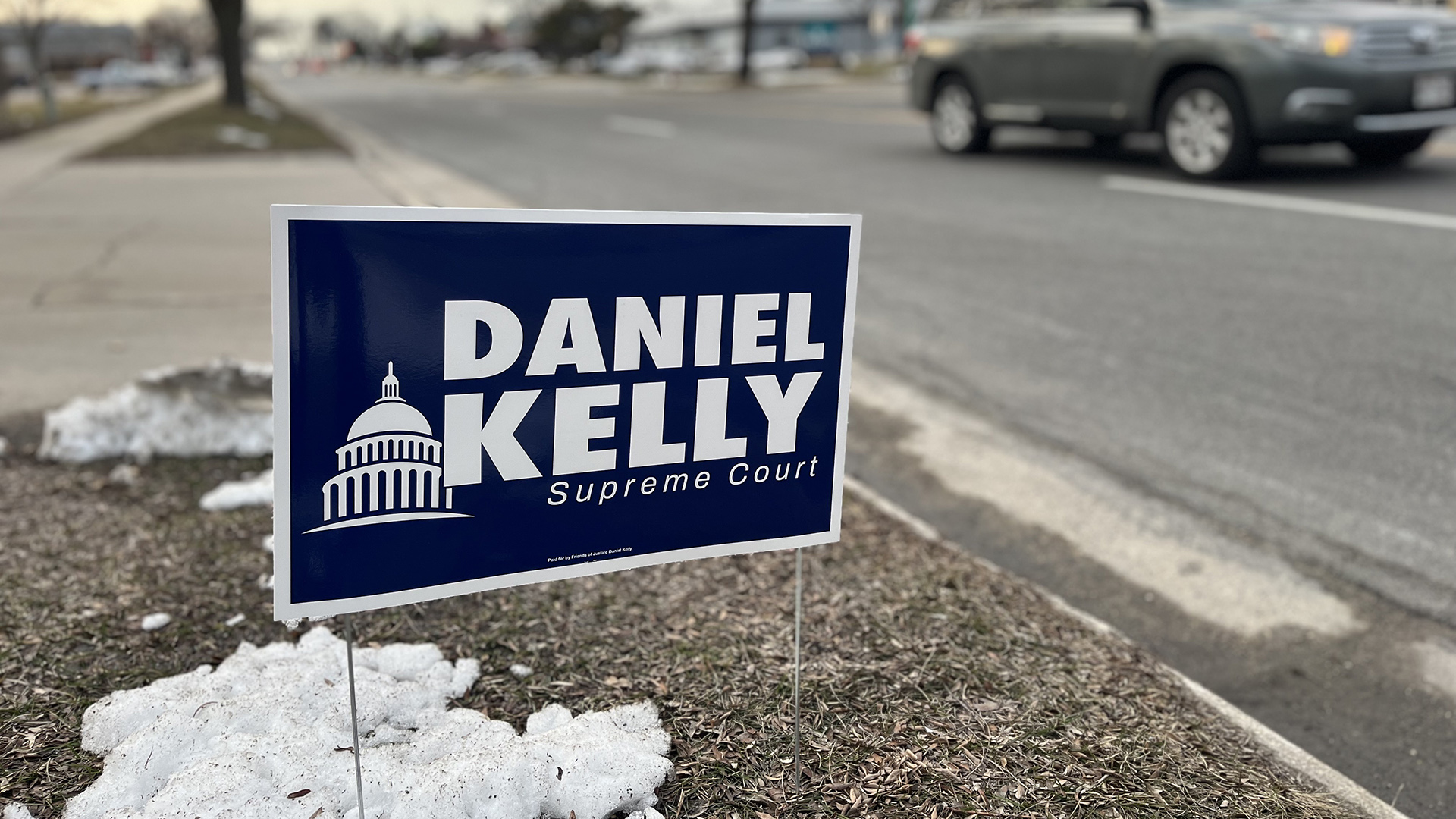
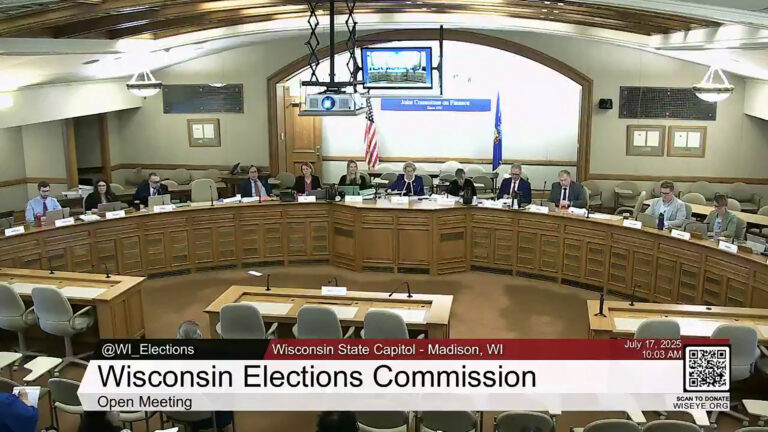
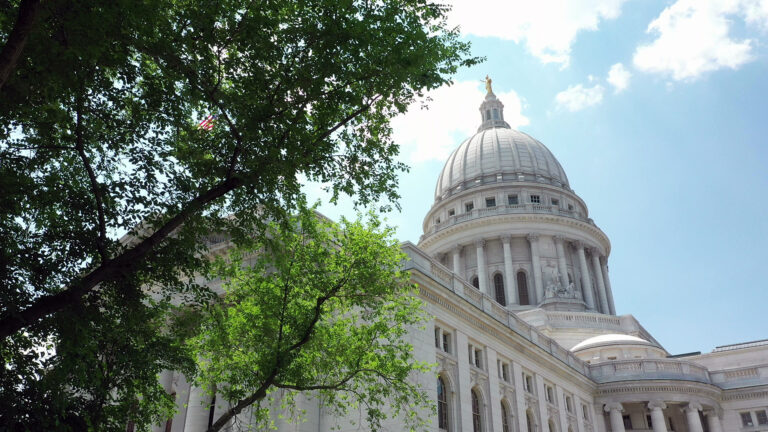





Follow Us